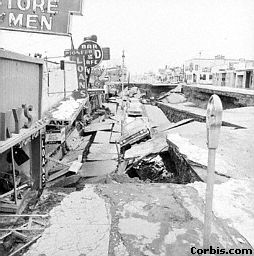
B.
Hazard- A possible source of danger: a natural hazard.

Natural hazard wise, California ranks among the most dangerous states to live in all the US. The primary source of risk in California comes from earthquakes. The San Andreas fault, among the largest faults in Northern California, runs along the entire coast of California. Coincedentally, all of California's largest cities are also along the coast. Los Angeles and San Francisco are especially at risk from an earthquake. In San Francisco, there have been two major earthquakes: the Great San Francisco Earthquake of 1906 and the Loma Prieta Earthquake of 1989. Both earthquakes caused significant damage to the city and its inhabitants. In Los Angeles, the Northridge Earthquake of 1994 alone caused 15 billion dollars worth of damage. Other natural hazards in California include tsunamis, floods, storms, hail, wildfires, and mudslides. Of these, only wildfires and mudslides are significant. Wildfires occur in the summer months, when the region is extremely dry. At this time, fires start easily and spread rapidly. Every year, this is a major problem as wildfires occasionally threaten homes. Mudslides occur in the fall and winter, when heavy rains hit California. Excessive rains sometimes cause the ground under home to shift, creating a mudslide. Mudslide also occur quite commonly and are a risk.
An excellent site on California's natural hazards in general
The Great 1906 San Francisco Earthquake
The Loma Prieta Earthquake of 1989
The Northridge Earthquake of 1994
California Bay Area hazard maps